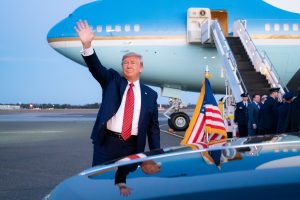More than a few commentators have noted that the United States is experiencing an unusual, almost unprecedented dearth of military and combat experience in the office of the president. Neither President Trump nor presumptive Democratic nominee Joe Biden served in the military; Bill Clinton and Barack Obama similarly found their way into politics from civilian careers. George W. Bush served in Texas Air National Guard, but saw no combat. Assuming either Trump or Biden serve out a full term, this will leave a 32 year gap, comparable only to the 36 year gap between Theodore Roosevelt and Harry S. Truman. The last actual combat veteran, George H.W. Bush, left office in 1993.
Does this gap matter to policy? Mileage will vary; the United States successfully waged two world wars during the previous military experience gap. Nevertheless, Claude Berube has done extensive work on the question of presidential military service, identifying several clusters and patterns across the history of the presidency. It’s notable, for example, how few politicians of any significance have emerged from the highest ranks of the United States Navy. While several presidents since the 1960s have begun their careers as junior naval officers, no senior commander has made the jump to the political sphere.
The closest was Senator John McCain, who left the Navy as a captain but then served a long career in the U.S. Senate before becoming the 2008 GOP presidential nominee. One admiral from a previous era came close; Admiral George Dewey, commander of the U.S. Asiatic Squadron at the Battle of Manila Bay in the Spanish-American War, made an exploratory run in 1900 for the Democratic nomination. Political inexperience cut that run short, however. The last serious candidate to make senior military leadership central to his candidacy was U.S. Army General Wesley Clark, who lost the 2004 Democratic nomination to John Kerry, another veteran of the junior officer ranks of the U.S. Navy.
It is worth noting that increasing prevalence of civilian backgrounds within U.S. political leadership places the United States in good company among Indo-Pacific nations. No Chinese leader since at least Deng Xiaoping has possessed significant professional military experience, very few Japanese leaders since World War II have served in the military at any level, and military service has not opened a pathway to power in India since independence, or in South Korea since the end of the military dictatorship. Even as military tensions across the region increase, political and military leadership have remained distinct from one another, and to all appearances will continue to do so for the foreseeable future.

































